Our representatives are available to schedule your appointment Monday through Friday from 9am to 5pm.
For a Northwell ambulance, call
(833) 259-2367.
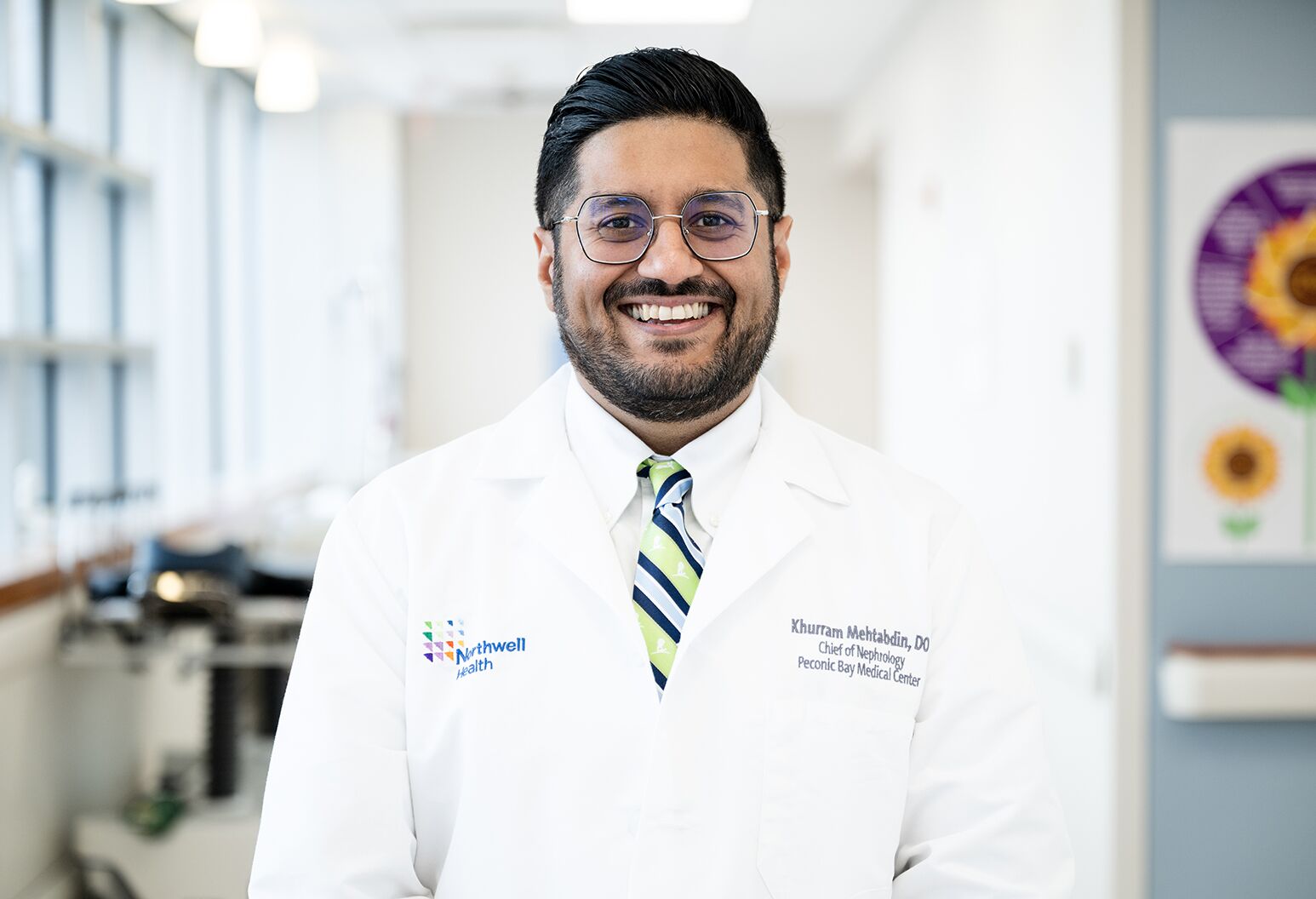
Sometimes one event truly can change everything. For Khurram Mehtabdin, DO, it was flying his critically ill infant daughter from their home in Long Island to Memphis, Tennessee, in December 2019. There, doctors at St. Jude’s Research Hospital had just completed a clinical trial on a small group of children with a specific type of brain cancer — the same cancer his own daughter, Imani, had been diagnosed with at just five weeks old.
Over the next several months, Imani underwent multiple rounds of intensive chemotherapy and a delicate surgery to remove her brain tumor. Dr. Mehtabdin and his wife, Sarah Syed, a cardiologist at Northwell's South Shore University Hospital, remained by their daughter’s side. “Our baby was on chemo, and we were thousands of miles away from home, during Covid in a city we didn’t know,” he says. “It was a really rough time.”
Six months later, when the jubilant family returned to New York after Imani’s successful treatment, Dr. Mehtabdin felt like a changed man. The recovery of his little girl had underscored for him the power of hope and the importance of family and friends — a perspective that has come to inspire and drive his work.
“My number one motivation is to keep patients local,” says Dr. Mehtabdin, who is now chief of nephrology at Peconic Bay Medical Center. “Having lived the other side of it, I understand more than ever how important it is for patients and their families to be closer to home and their support systems.”
To that end, Dr. Mehtabdin has been growing kidney services for the eastern Long Island community, building a strong nephrology department and taking a passionate interest in each and every patient. Within a few short years, he’s helped implement advanced kidney treatment programs, acquired new technologies and expanded critical care capabilities at Peconic Bay Medical Center. “I don’t want patients to have to leave their community to find the best care. I want to treat them right here, close to home.”
If you’re healthy, it’s easy to ignore your kidneys. But when they’re damaged, what results is chronic kidney disease; wastes and toxins can build up in the bloodstream and lead to swelling, fluid in the lungs, impaired heart function and other complications. The two most common causes of chronic kidney disease are diabetes and high blood pressure. With those on the rise, chronic kidney disease is spiking too — more than 1 in 7 adults are estimated to have chronic kidney disease, according to the Centers for Disease Control and Prevention — and the numbers are expected to keep climbing.
Until recently, patients in eastern Suffolk County who needed acute or critical kidney care would be transported west for treatment, to larger institutions or into the city. But over the past few years, Dr. Mehtabdin and his team have taken steps to bring lifesaving care to the community.
One advance he championed, called CRRT, makes a big difference for the sickest of patients. CRRT is an advanced dialysis program for patients in the intensive care unit. Traditional dialysis does the job for injured or nonfunctioning kidneys by filtering the blood for three or four hours at a time, a few days a week. CRRT is a non-stop, 24-hour therapy — filtering blood more slowly and gradually, which is gentler on the body. “Now, ICU patients who would otherwise be unable to tolerate traditional dialysis — perhaps because their blood pressures are too low or they are extremely sick — no longer need to be airlifted to outside facilities for this level of care,” says Dr. Mehtabdin. “We can take care of them right where they are.”
Peritoneal dialysis is a method of dialysis that filters the blood without requiring a patient to be attached to a machine. Instead, it works inside the body by using the peritoneum, the inner lining of the abdomen, as a filter to remove wastes from the blood. Some patients can even perform the treatment at home.
Peconic Bay Medical Center and Northwell Health recently opened one office offering kidney services in Riverhead and another in Hampton Bays — as well as a new dialysis center about a mile from the hospital, in partnership with DaVita Kidney Care. These offices expand and elevate kidney care in the community, allowing them more freedom and independence as they get their necessary treatment.
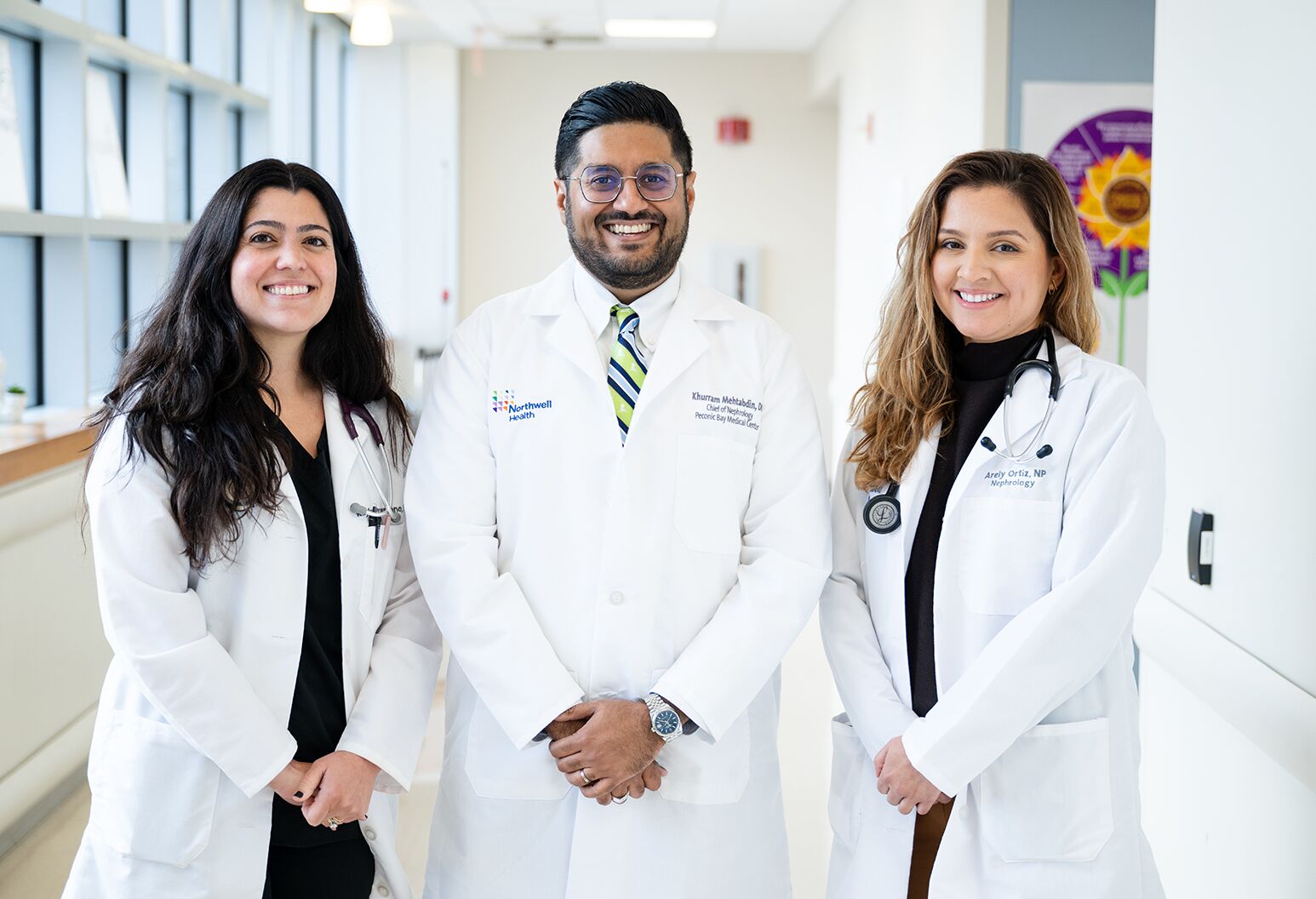
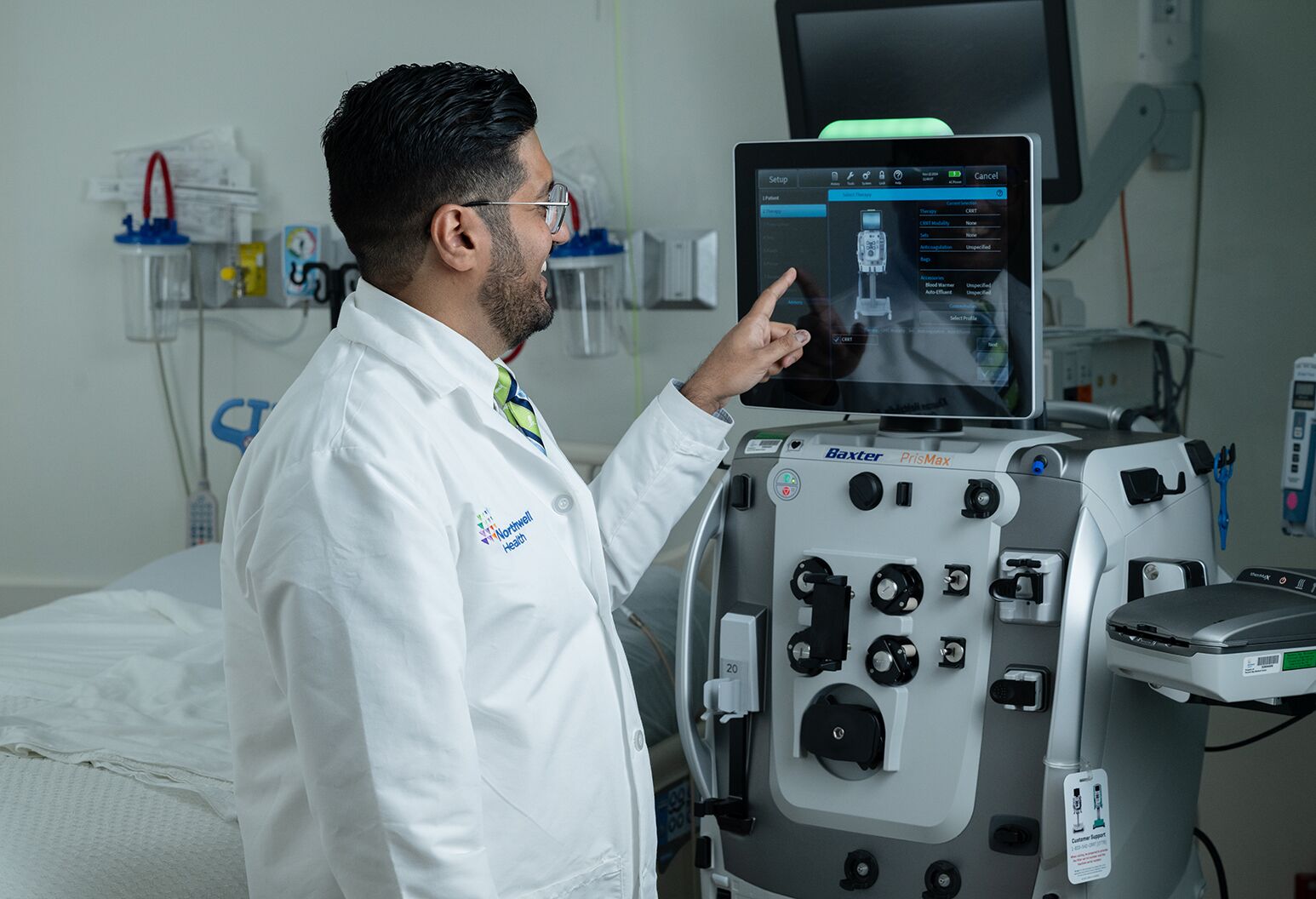
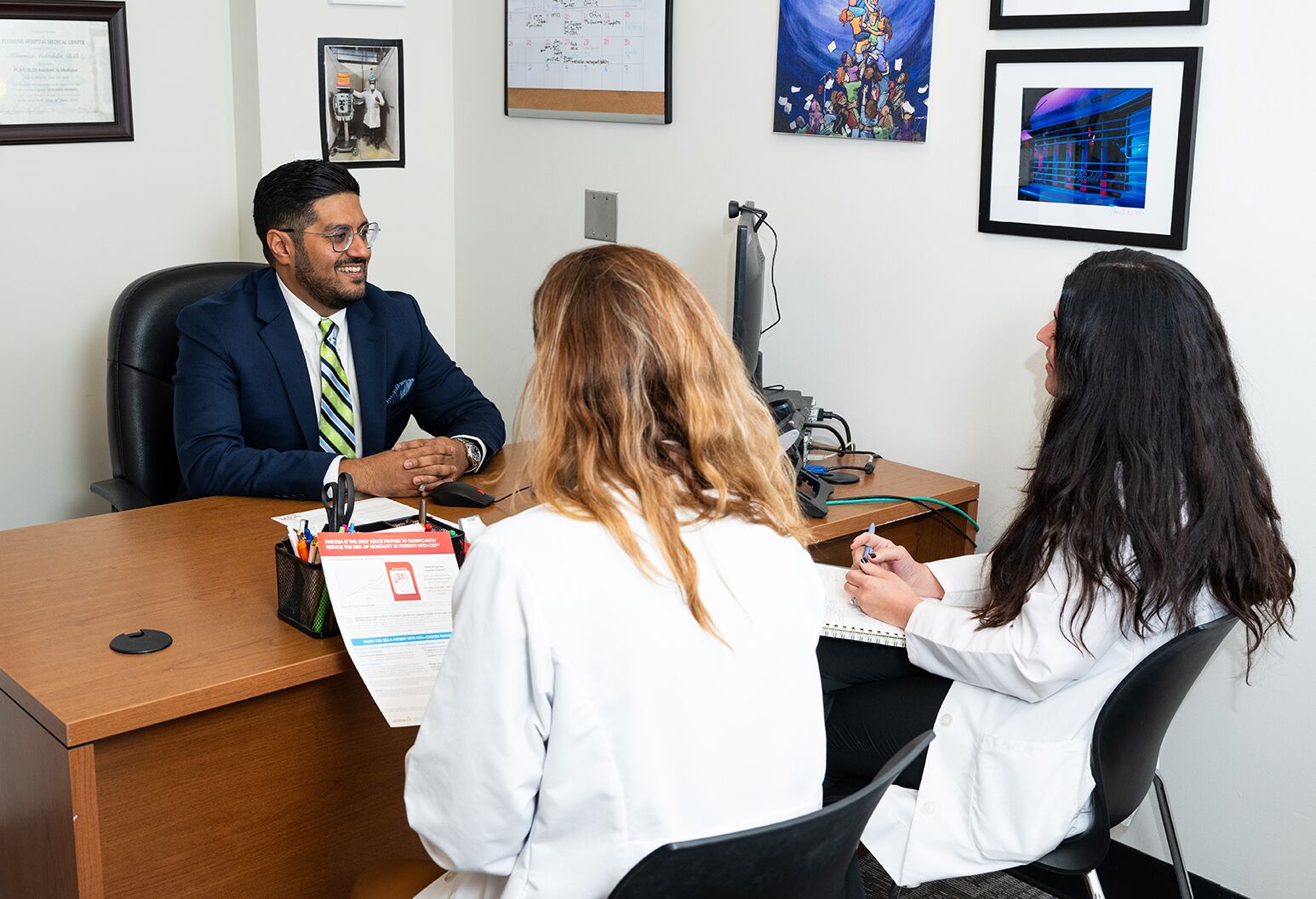
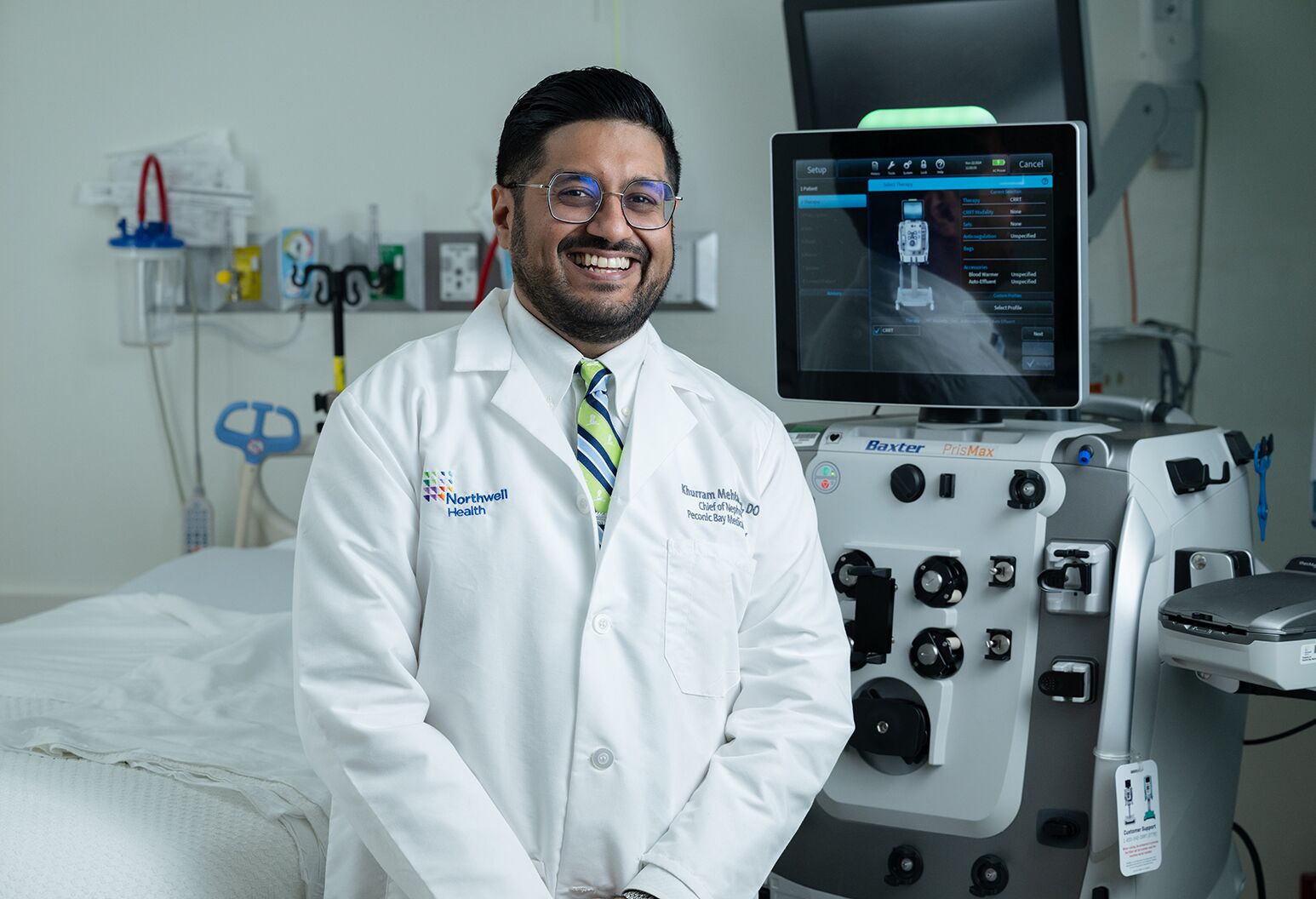
For all the work he does to provide access to the latest advancements in kidney treatments, Dr. Mehtabdin knows nothing is more important for his patients than compassion and connection. That’s a lesson he learned from his experience with his daughter Imani — and from his mother. “My mom was the town doctor,” he says. Born in Pakistan, she emigrated to the United States and landed in Albany, NY, where she practiced family medicine and where Dr. Mehtabdin was born and raised. “Her small office was our family business,” he laughs. His father — a PhD and economics professor at a nearby private college — served as the office manager, and Dr. Mehtabdin worked alongside them both. “On weekends and days off from school, I would file charts and stock supplies,” he says. Often, he’d drive his mom to check on an elderly patient at home or drop off samples of medication to those who could not afford them.
“That’s the stuff that stuck with me the most — the way she took care of everyone in our community,” he says. So, when Dr. Mehtabdin chose to pursue medicine, he vowed to offer the same compassion to each of his own patients.
“Karen” (not her real name) was one of them. Karen’s case was complicated: In 2020, she underwent a liver transplant, but two years later, her new liver began to fail, followed by her kidneys. She began dialysis at Peconic Bay Medical Center — and that’s when Dr. Mehtabdin took over her care.
Karen showed up for every doctor appointment and dialysis treatment, but she began to retain fluid, her body in crisis. Her situation was perilous: Without a new liver and kidney, she had only a few months to live. So Dr. Mehtabdin and her nurse practitioner, Kayla Provenzano, FNP-BC, presented her case to the transplant team at Northwell's North Shore University Hospital.
They advocated for Karen fiercely. “Karen was a mom to young kids — and despite dialysis treatments several times a week, she made it to every recital, every practice,” he says. “Everyone deserves another chance at life.”
In February 2023, Karen got a new liver and kidney. “Dr. Mehtabdin saved my life,” she says. “He pushed for me when I didn’t know how to push for myself.”
For Dr. Mehtabdin, a patient’s emotions, family and story are just as important as their illness. He sees his work to bring advanced care to Peconic Bay Medical Center and advocate for every patient’s health as a calling; his mission is to serve the community that he calls home. It’s where he and his wife are raising their two daughters: Amalia, who will turn two in June, and Imani, who celebrated her 5th birthday this past November — happy, healthy and surrounded by family and friends. And it’s where he’s committed to paying forward his good fortune every single day.
“I’m right here,” he says, “and I’m here to serve.”
Our representatives are available to schedule your appointment Monday through Friday from 9am to 5pm.
For a Northwell ambulance, call
(833) 259-2367.